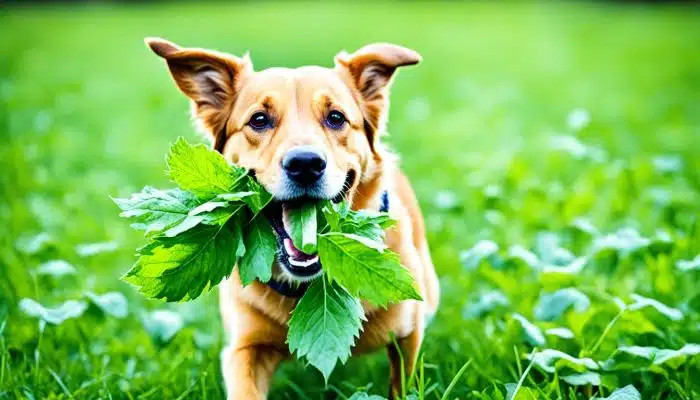
If you’re a new golden retriever puppy owner, you’re probably wondering what the best food is for your furry friend. Feeding your puppy a nutritious and balanced diet is essential for their health and growth. With so many options available, it can be challenging to determine which brand or type of food is best.
In this section, I’ll provide you with everything you need to know about feeding your golden retriever puppy. We’ll explore the nutritional needs of your puppy, discuss top-rated food options, and provide feeding guidelines. By the end of this section, you’ll have a better understanding of how to provide the best food for your furry friend.
Key Takeaways:
- Feeding your golden retriever puppy a balanced and nutritious diet is essential for their growth and health.
- Understanding their specific nutritional needs and selecting the right food brand is crucial.
- Consult with your veterinarian for personalized recommendations and guidelines based on your puppy’s specific needs.
- Establishing a proper feeding routine and following recommended guidelines is important for your puppy’s development.
- Addressing any specific dietary concerns or sensitivities is crucial for ensuring optimal nutrition for your puppy.
Understanding the Nutritional Needs of Golden Retriever Puppies
Just like humans, golden retriever puppies require a balanced diet that meets their nutritional needs to grow and develop properly. To ensure your furry friend is getting all the essential nutrients in their diet, it’s important to understand their specific dietary needs.
One of the most important aspects of a golden retriever puppy’s diet is the need for high-quality protein. This helps to support their muscle and tissue growth, allowing them to develop properly. Additionally, they require a balance of carbohydrates and fats to fuel their energy needs and support their overall health.
When selecting puppy food for golden retrievers, it’s crucial to choose a brand that is specifically formulated for their needs. Look for options that have high-quality protein sources, such as chicken, lamb, or fish. Avoid purchasing food that contains fillers or artificial preservatives that can harm your puppy’s health.
Nutrients Required in the Diet
| Nutrient | Function |
|---|---|
| Protein | Supports muscle and tissue growth |
| Carbohydrates | Provide energy |
| Fat | Contributes to healthy coat and skin |
| Calcium | Supports bone growth and development |
| Phosphorus | Assists with bone and tissue growth |
Along with these essential nutrients, golden retriever puppies require a balanced mix of vitamins and minerals to support their overall health and well-being. Be sure to consult with your veterinarian to ensure your puppy’s diet meets all their specific needs.
Choosing the right food for your golden retriever puppy is essential to their growth and development. By understanding their nutritional needs and selecting high-quality, balanced food options, you can give them a healthy start to life.
Top-Rated Food for Golden Retriever Puppy

When it comes to choosing the best food for your golden retriever puppy, there are numerous options available on the market that can be overwhelming to sort through. Fortunately, experts and fellow golden retriever owners alike have shared their recommendations and experiences, giving us a selection of top-rated food options to choose from.
First on the list is Blue Buffalo Life Protection Formula Puppy Chicken and Brown Rice Recipe. This highly rated food brand uses real chicken as the first ingredient and contains a mix of nutrients such as calcium, phosphorus, and essential vitamins. The recipe also includes brown rice and other wholesome grains for optimized energy levels, and omega-3 and omega-6 fatty acids to support healthy skin and a shiny coat. Plus, Blue Buffalo Life Protection Formula is free from poultry by-product meals, corn, wheat, and soy, offering a wholesome, nutritious meal for your furry friend.
Another excellent choice is Hill’s Science Diet Puppy Large Breed Chicken Meal and Oats Recipe, designed specifically for large breed puppies like golden retrievers. This food option provides precisely balanced nutrition, with quality protein from chicken meal to help build strong muscles and maintain a healthy body weight. It also includes a range of vitamins, minerals, and amino acids to support joint health, immunity, and overall bone growth. The recipe uses natural, high-quality ingredients and is free from artificial colors, flavors, or preservatives, ensuring your puppy gets all the nutrients they need with optimal digestion.
For those looking for a grain-free option, Merrick Grain-Free Puppy Recipe is an excellent choice. Formulated to meet the nutritional needs of growing puppies, this high-protein food option prioritizes real deboned chicken and other wholesome ingredients such as sweet potato and peas, which are easy to digest and gentle on the stomach. This recipe is also free from artificial colors, flavors, and preservatives and is packed with essential nutrients such as DHA for cognitive development and glucosamine and chondroitin to support joint health. The natural fiber content in the food recipe promotes healthy digestion, and with a high 32% protein content, it offers adequate support for your Golden Retriever pup’s growth and development.
“The right food choice is critical to your Golden Retriever puppy’s growth and overall health. These top-rated food recommendations can help narrow down your options while providing a balanced and nutritious diet for your furry friend”.
Healthy and Nutritious Food for Golden Retriever Puppy
Selecting the right food for your golden retriever puppy can be overwhelming, but it’s crucial to provide them with a balanced and nutritious diet to support their overall health and well-being. When choosing healthy food for your furry friend, consider the following factors:
- The ingredients list: Quality food for your golden retriever puppy should contain high-quality protein sources, such as chicken, lamb, fish, or beef, and whole food ingredients like vegetables, fruits, and grains. Avoid food with fillers or by-products.
- The specific needs of your puppy: Depending on factors such as their age, weight, and activity level, your golden retriever puppy may require different nutrient levels. Consult with your veterinarian to determine the best food for your puppy.
- The food type: There are various types of food available, including dry kibble, wet food, and raw diets. Choose an option that fits your puppy’s preferences and lifestyle.
- The brand reputation: Look for brands that have a good reputation and are known for producing nutritious and healthy food for golden retriever puppies.
An excellent example of a healthy and nutritious food for golden retriever puppies is the Bil-Jac brand’s Puppy Select Formula. This food is made with fresh, high-quality chicken as the first ingredient and contains essential nutrients, including omega-3 fatty acids, to support healthy brain and eye development. It also has no fillers, gluten, or soy, making it a great option for puppies with sensitivities.
| Brand | Main Ingredient | Special Feature | Price per Pound |
|---|---|---|---|
| Bil-Jac Puppy Select Formula | Chicken | Rich in omega-3 fatty acids for healthy brain and eye development | $3.29 |
| Blue Buffalo Life Protection Puppy Chicken and Brown Rice Recipe | Deboned chicken | No poultry by-product meals, corn, wheat, soy, or artificial preservatives | $2.11 |
| Hill’s Science Diet Puppy Chicken Meal and Barley Recipe | Chicken meal | Vitamins C and E for immunity | $1.85 |
Remember that each puppy has unique needs and preferences, so don’t be afraid to try different options until you find the one that works best for your furry friend’s health and happiness.
Recommended Feeding Guidelines for Golden Retriever Puppy

Feeding your golden retriever puppy with the recommended food is not enough. You also need to establish a proper feeding routine to ensure their growth and development. Here are some essential tips and guidelines to follow:
- Choose the right food: Look for high-quality food that is specifically formulated for golden retriever puppies like Blue Buffalo Life Protection Puppy Food or Hill’s Science Diet Puppy Food. Ensure the food contains all the essential nutrients like protein, carbohydrates, fat, vitamins, and minerals.
- Feed according to weight: Follow the recommended feeding guidelines of the brand you choose to feed your puppy. Generally, golden retriever puppies need to be fed multiple times a day, about 3-4 meals, and the amount of food should be based on their weight, age, and activity level.
- Monitor their weight: Weigh your puppy weekly to ensure they are gaining weight according to their ideal growth rate. If you notice any sudden weight loss or gain, consult your veterinarian for advice on adjusting their feeding routine.
- Limit treats: Treats are an essential part of puppy training and bonding. However, limit the number of treats and ensure they are healthy and nutritious. Merrick Power Bites or Zuke’s Mini Naturals are great options for your furry friend.
- Provide fresh water: Ensure your golden retriever puppy has access to fresh water at all times. Change their water daily and wash their water bowl regularly to avoid bacteria build-up.
Following these recommended feeding guidelines will help ensure your golden retriever puppy receives a balanced and nutritious diet to support their overall health and well-being.
Addressing Specific Dietary Concerns for Golden Retriever Puppies
While golden retrievers are known to be healthy and hardy dogs, some may have specific dietary concerns or sensitivities that need to be addressed for optimal health. Here are some common issues and recommendations for addressing them:
Food Allergies
Like humans, dogs can develop allergies to certain foods. Common symptoms may include gastrointestinal distress, skin irritations, and ear infections. Some common allergens for golden retrievers include beef, chicken, and grains like wheat and corn.
If you suspect your puppy has a food allergy, consult with your veterinarian about conducting an elimination diet. This involves identifying and removing potential allergens from their diet and gradually reintroducing them back in to determine which ones are triggering the allergic reaction.
Digestive Issues
Golden retriever puppies may experience digestive issues such as diarrhea, constipation, or vomiting. These issues can be caused by various factors, including their food intake, stress, and underlying health conditions.
To address digestive issues, it is essential to ensure your puppy is eating a well-balanced diet with high-quality ingredients. You can also try feeding smaller, more frequent meals and avoiding table scraps or other human foods that may upset their stomach.
Obesity
Golden retriever puppies are prone to becoming overweight or obese, which can lead to a variety of health issues. This issue may be caused by overfeeding, lack of exercise, or genetics.
To address obesity, it is important to ensure your puppy is receiving a healthy and balanced diet with appropriate portion sizes. Additionally, incorporating regular exercise and play can help them maintain a healthy weight.
By addressing these specific dietary concerns promptly and appropriately, you can ensure your golden retriever puppy receives the nutrition they need to thrive and avoid potential health complications.
Conclusion
As a golden retriever owner, I understand the importance of providing my puppy with the best possible nutrition. Through my research, I have learned about the specific nutritional needs of golden retriever puppies and the top-rated food options available. By selecting healthy and nutritious food, following recommended feeding guidelines, and addressing any specific dietary concerns, I can ensure my puppy grows and develops properly.
Remember, each puppy is unique, and it’s essential to consult with your veterinarian for personalized advice and recommendations. By working together and providing the best care possible, we can ensure our furry friends live happy, healthy lives.
FAQ
What is the best food for a golden retriever puppy?
The best food for a golden retriever puppy is a high-quality puppy food specifically formulated for large breed puppies. Look for a brand that provides a balanced diet with essential nutrients, such as protein, vitamins, and minerals, to support their growth and development.
How much should I feed my golden retriever puppy?
The amount of food to feed your golden retriever puppy will depend on their age, weight, and activity level. It is recommended to follow the feeding guidelines provided by the specific brand of puppy food you choose. As a general guideline, divide their daily portion into multiple meals to prevent overeating and digestive issues.
When can I switch my golden retriever puppy to adult dog food?
Golden retriever puppies typically transition to adult dog food around 12 to 18 months of age. Consult with your veterinarian to determine the appropriate timing based on your puppy’s individual growth and nutritional needs.
Can I give my golden retriever puppy treats?
Yes, you can give your golden retriever puppy treats as a part of their overall diet. However, it is important to choose treats that are specifically formulated for puppies and offer nutritional benefits. Treats should be given in moderation to avoid overfeeding and weight gain.
Are there any foods that are harmful to golden retriever puppies?
Yes, certain foods can be harmful to golden retriever puppies. Avoid feeding them chocolate, caffeine, grapes, raisins, onions, garlic, and any foods that are toxic to dogs. Also, be cautious of feeding them fatty or processed foods as it can lead to digestive issues and obesity.
Should I consult with my veterinarian about my golden retriever puppy’s diet?
Absolutely! Your veterinarian is the best resource for personalized advice regarding your golden retriever puppy’s diet. They can assess your puppy’s specific needs, help you choose the right food, and provide guidance on feeding amounts and frequency.




